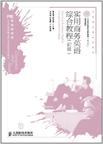实用商务英语综合教程
2011-9
人民邮电出版社
李玉萍,胡多军 主编
156
本书系列教材分为初级、中级、高级3册。本书是套书的初级教材,本教材编写了8个单元,以“项目引领、任务驱动”的形式编写,每一个单元为一个项目,围绕一个话题,内容涉及接待客户、商务电话、商务会议、社交礼仪、工作职业、信息呈现、产品概述及公司介绍等,每个单元包括背景介绍、热身讨论、听说训练、阅读强化、语法复习、案例分析和实用写作7个模块,并在各模块中以任务的形式插入各种练习,全面培养学生听、说、读、写、译的能力。
本书可以作为高职高专商务英语专业、国际贸易专业、国际商务专业的专业英语教材使用,也适合作为高职高专财经类院校英语课程的公共教材。
本书附有听力材料的MP3录音光盘。另外,书后附有按字母顺序排列的总词汇表,标注了每个单词的音标,英文注释后括号中的数字表明单词或词组出现的章节。
Unit 1 Meeting and Entertaining Clients
Listening & Speaking
Meeting and Receiving Clients
Reading
Intensive Reading: Corporate Entertainment
Fast Reading: Places You Should Avoid When Meeting Clients
Grammar & Usage
English Basic Sentence Patterns 英语基本句型
Practical Writing
Notes 便条
Unit 2 Telephoning
Listening & Speaking
Making and Answering Phone Calls
Reading
Intensive Reading: How to Make a Successful Phone Call
Fast Reading: How Much Do You Know About Telephone?
Grammar & Usage
Simple Present Tense 一般现在时
Practical Writing
Telephone Message 电话记录
Unit 3 Meetings
Listening & Speaking
Arranging and Organizing Meetings
Reading
Intensive Reading: Business Meeting Etiquette
Fast Reading: Having Meetings in Virtual Space
Grammar & Usage
Simple Past Tense 一般过去时
Practical Writing
Notices 通知
Unit 4 Social Manners
Listening & Speaking
Talking About Etiquette and Appropriate Table Manners
Reading
Intensive Reading: Workplace Social Etiquette
Fast Reading: International Business Etiquette Tips
Grammar & Usage
Simple Future Tense 一般将来时
Practical Writing
E-mail 电子邮件
Unit 5 Jobs and Careers
Listening & Speaking
Talking About Jobs
Reading
Intensive Reading: Developing a Job Description
Fast Reading: Migrant Workers Stay Home
Grammar & Usage
Present Progressive 现在进行时
Practical Writing 88
Resume 简历
Unit 6 Presenting Information
Listening & Speaking
Making A Good Presentation
Reading
Intensive Reading: The Art of Oral Presentation
Fast Reading: Presentation for the 6th CICGF and Ningbo Trade
Mart
Grammar & Usage
Past Progressive 过去进行时
Practical Writing
Poster 海报
Unit 7 Products
Listening & Speaking
Developing and Launching New Products
Reading
Intensive Reading: The Product Life Cycle
Fast Reading: New Products Development Process
Grammar & Usage
Future Progressive 将来进行时
Practical Writing
Memo 备忘录
Unit 7 Company
Listening & Speaking
Cooperating Between Companies Introducing The Structure of
Companies
Reading
Intensive Reading: Walmart Needs to Inject More Creativity for
Growth
Fast Reading: Types of Business Organization
Grammar & Usage
Present Perfect Tense 现在完成时
Practical Writing
Fax 传真
Appendix Vocabulary
The key to giving out business cards in any culture is to show respect for the other person. Present your card so that the other person does not have to turn it over to read your information. Use both hands to present your card to visitors from Japan, China, Singapore, or Hong Kong. When you receive someone else's business card, always look at it and acknowledge it. When you put it away, place it carefully in your card case or with your business documents. Sticking it haphazardly in your pocket is impolite to the giver. In most cases, wait until you have been introduced to give someone your card. Valuing time People's attitudes toward time vary from country to country. So don't take it personally if someone from a more relaxed culture keeps you waiting or spends more of that commodity than you normally would in'meetings or over meals. Stick to the rules of punctuality, but be understanding when your contact from another country seems unconcerned. Honoring space issues Americans have a particular value for their own physical space and are uncomfortable when other people get in their realm. If the international visitor seems to want to be close, accept it. Backing away can send the wrong message. So can touching. You shouldn't risk violating someone else's space by touching them in any way other than with a handshake. Whether the world comes to you or you go out to it, the greatest compliment you can pay your international clients is to learn about their country and their customs. Understand differences in behavior and honor them with your actions. Don't take offense when visitors behave according to their norms. People from other cultures will appreciate your efforts to accommodate them and you will find yourself building your international clientele. ……
